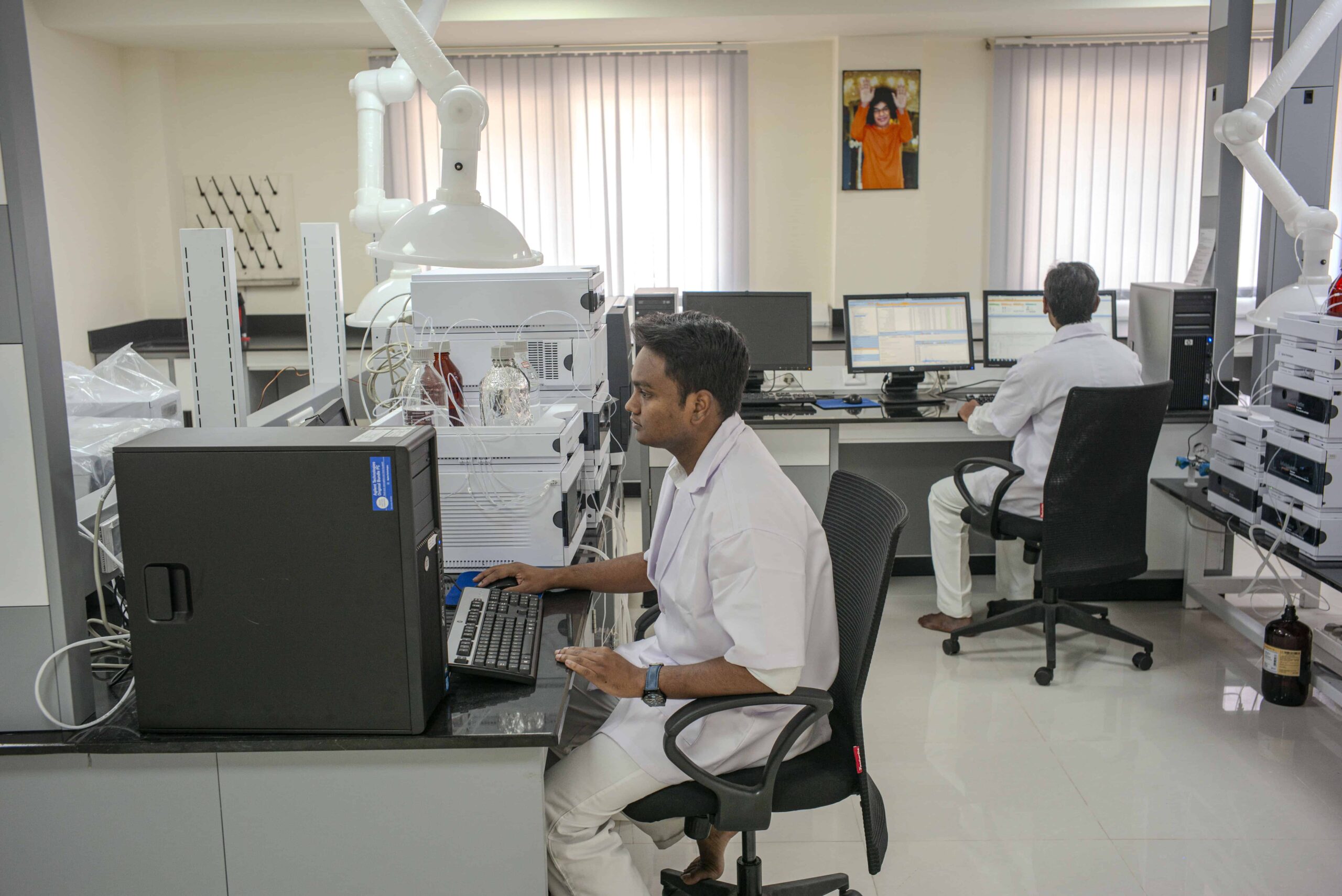Undergraduate Programme
For Men

Duration: 4 Years
We stand on the brink of a revolution where Artificial Intelligence (the creation of computer systems that can execute tasks demanding human-like intelligence) and Computational Biology (the application of data analysis, mathematical modeling, and computational simulations to gain insights into biological systems and connections) will greatly improve our lives across various fields, including Healthcare, Pharmaceuticals, Biotechnology, Data Science, Bioinformatics, AI research and development, Environmental Studies, and Forensics.
This innovative programme is designed to build core competencies in biological, computer and data sciences. It will allow students to seamlessly operate across the frontier areas of Artificial intelligence (AI), Computational Biology and Data Science and apply them to solve biological problems.
In the first year, the students will be trained in Mathematics, Computer Programming and Modern Biology fundamentals. In Year 2, they will be introduced to Statistics and AI. In Year 3, the focus will be on learning the applications of Biotechnology, Bioinformatics, AI and Machine Learning, followed by training on the skills required to undertake research projects.
In Year 4, the research project (under the joint supervision of faculty across disciplines) will give students an opportunity to apply AI, Computational Biology and Data sciences to develop potential solutions to real-world challenges in biomedical sciences.
Graduates of this programme will find various career paths across multiple disciplines. They can also engage in research in areas such as developing biological algorithms, analyzing the structure of biological entities, studying genomic diversity, exploring comparative genomics, engineering genomes, designing molecular medicine, and conducting Multi-Omic* data studies.
*a field of study in biological sciences that ends with -omics, such as genomics, transcriptomics, proteomics or metabolomics.
B.S. (Hons.) in Artificial Intelligence and Computational Biology
For students who complete a 4-year (8-semester) programme of study.
B.S. (Hons. with Research) in Artificial Intelligence and Computational Biology
For students who secure a CGPA of 7.5 or more after the first six semesters (3 years of study) and pursue a research project during the fourth year.
Entry & Exit options as per NEP 2020 Policy.
- 10+2 years of schooling from a recognized board (CBSE or equivalent)
- Either passed or appeared for Final exams at XII level before Admissions. If not appeared for XII Standard exams, X and XI Standard marks will be considered
- The candidate must take either one of the following subject combinations at XI and XII Standard:
– Mathematics, Biology, Physics and Chemistry
– Mathematics, Physics and Chemistry
– Biology, Physics and Chemistry with an equivalent course (XII Standard / Intermediate) in Mathematics (online / distance mode) - Consistent academic performance of 60% aggregate marks in X and/or XII Standard
- Age: Preferably below 19 years as of 30th June in the year of admission
YEAR 1
Semester 1
Mathematics: Differential Calculus
Computer Science: Introduction to Algorithms
Biology: The Dynamic Cell
Biology: Introduction to Laboratory Science (Practical)
Computer Science – Basic Programming in Python
Awareness Course I: Sai Education for Transformation (Based on Bhagawan Baba’s Life and Teachings)
Semester 2
Mathematics: Integral Calculus
Computer Science: Discrete Mathematics
Biology: Microbiology
Biology: Cell and Microbiology (Practical)
Computer Science: Programming, Data Structures and Algorithms Using Python
Awareness Course II: Unity of Religions
YEAR 2
Semester 3
Mathematics: Linear Algebra
Statistics: Introduction to Statistics
Biology: Biochemistry
Biology: Biochemistry (Practical)
Computer Science: Data visualization with R
Awareness Course III: Study of Classics I – Ramakatha Rasavahini
Semester 4
Mathematics: Differential Equations
Design and Analysis of Algorithms in Mathematical Sciences and Computing
Biology: Principles of Genetics
Statistics: Probability Theory and Distributions
Artificial Intelligence: An Introduction to Artificial Intelligence
Awareness Course IV: Study of Classics II – Bhagavatha Vahini
YEAR 3
Semester 5
Biology: Molecular Biology
Biology: Molecular Biology (Practical)
Statistics: Statistical Inference
Computational Biology: Bioinformatics and Computational Biology
Specialization Elective – I
Computer Science: Cyber security
Awareness Course V: Ethos and Values for the Changing World
Semester 6
Computer Science: Database Management Systems
Artificial Intelligence: Artificial Intelligence for Computational Biology – I
Mathematics: Mathematics for Machine Learning
Biology: Epidemiology and Public Health
Specialization Elective – II
Mini Project
Awareness Course VI: Life and its Quest
YEAR 4
Semester 7
B.S. (Hons.) Courses:
Biology: Multi-OMICS
Artificial Intelligence: Machine Learning and AI
Specialization Elective – III
Specialization Elective – IV
Specialization Elective – V
Project / Interim Review
Awareness Course VII: Education for Life
B.S. (Hons. with Research) Courses:
Biology: Multi-OMICS
Artificial Intelligence: Machine Learning and AI
Specialization Elective – III
Research Methodology
Massive Open Online Course (MOOC) (e.g. Swayam)
Research Project / Interim Review
Awareness Course VII: Education for Life
Semester 8
B.S. (Hons.) Courses:
Mathematics: Mathematical Modelling
Specialization Elective – VI
Project
Awareness Course VIII: God, Society and Man
B.S. (Hons. with Research) Courses:
Mathematics: Mathematical Modelling
Research Project
Awareness Course VIII: God, Society and Man
ELECTIVES
Students will be offered a choice of electives that span the disciplines of Biotechnology, Bioinformatics, Computer Science, Data Science, and Artificial Intelligence. Some of these electives will be Industry-oriented and delivered by experts from the relevant Industry.
RESEARCH PROJECT
Interdisciplinary project with research supervisors from the Department of Biosciences and Mathematics & Computer Sciences.

